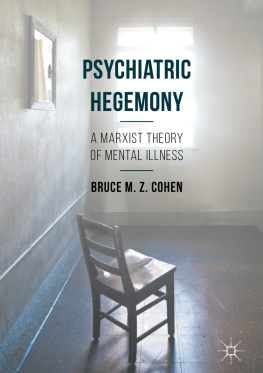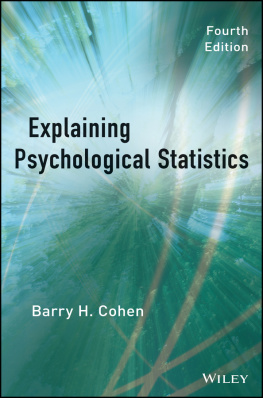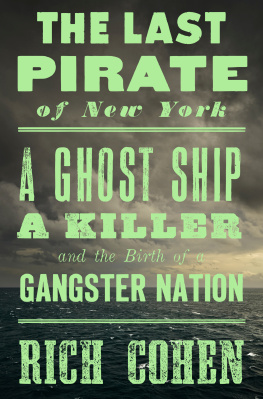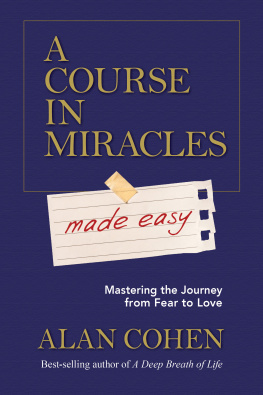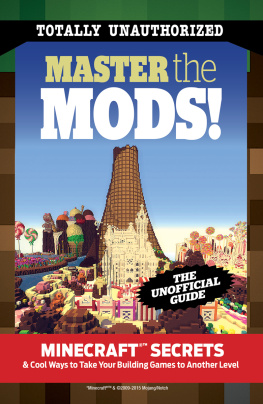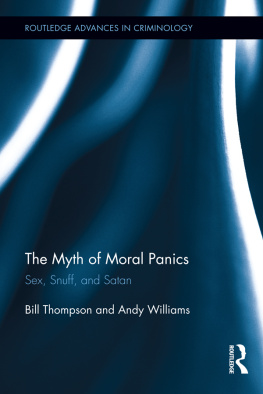Cohen - Folk devils and moral panics: the creation of the mods and rockers
Here you can read online Cohen - Folk devils and moral panics: the creation of the mods and rockers full text of the book (entire story) in english for free. Download pdf and epub, get meaning, cover and reviews about this ebook. City: London;Großbritannien, year: 2011, publisher: Taylor & Francis;Routledge, genre: Politics. Description of the work, (preface) as well as reviews are available. Best literature library LitArk.com created for fans of good reading and offers a wide selection of genres:
Romance novel
Science fiction
Adventure
Detective
Science
History
Home and family
Prose
Art
Politics
Computer
Non-fiction
Religion
Business
Children
Humor
Choose a favorite category and find really read worthwhile books. Enjoy immersion in the world of imagination, feel the emotions of the characters or learn something new for yourself, make an fascinating discovery.
Folk devils and moral panics: the creation of the mods and rockers: summary, description and annotation
We offer to read an annotation, description, summary or preface (depends on what the author of the book "Folk devils and moral panics: the creation of the mods and rockers" wrote himself). If you haven't found the necessary information about the book — write in the comments, we will try to find it.
Folk devils and moral panics: the creation of the mods and rockers — read online for free the complete book (whole text) full work
Below is the text of the book, divided by pages. System saving the place of the last page read, allows you to conveniently read the book "Folk devils and moral panics: the creation of the mods and rockers" online for free, without having to search again every time where you left off. Put a bookmark, and you can go to the page where you finished reading at any time.
Font size:
Interval:
Bookmark:
Folk Devils and Moral Panics
... a brilliant and subtle exercise in grounded theory.
Stuart Hall, Emeritus Professor, The Open University
Richly documented and convincingly presented
New Society

Routledge Classics contains the very best of Routledge publishing over the past century or so, books that have, by popular consent, become established as classics in their field. Drawing on a fantastic heritage of innovative writing published by Routledge and its associated imprints, this series makes available in attractive, affordable form some of the most important works of modern times.
For a complete list of titles visit
www.routledge.com/classics
Stanley
Cohen
Folk Devils and Moral Panics
The creation of the Mods and Rockers

First published 1972 by MacGibbon and Kee Ltd
Reprinted in paperback 1973 by Paladin
And with a new introduction 1980
by Martin Robertson and Company Ltd
Second edition published 1987 by Basil Blackwood Ltd
Third edition published 2002 by Routledge
First published in Routledge Classics 2011
by Routledge
2 Park Square, Milton Park, Abingdon, Oxon OX14 4RN
Simultaneously published in the USA and Canada
by Routledge
711 Third Avenue, New York, NY 10017
Routledge is an imprint of the Taylor & Francis Group, an informa business
1972, 1980, 1987, 2002 Stanley Cohen
The right of Stanley Cohen to be identified as author of this work has been asserted by him in accordance with sections 77 and 78 of the Copyright, Designs and Patents Act 1988.
All rights reserved. No part of this book may be reprinted or reproduced or utilised in any form or by any electronic, mechanical, or other means, now known or hereafter invented, including photocopying and recording, or in any information storage or retrieval system, without permission in writing from the publishers.
Trademark notice: Product or corporate names may be trademarks or registeredtrademarks, and are used only for identification and explanation without intent to infringe.
British Library Cataloguing in Publication Data
A catalogue record for this book is available from the British Library
Library of Congress Cataloging-in-Publication Data Cohen, Stanley.
Folk devils and moral panics : The creation of the Mods and Rockers /
Stanley Cohen.
p. cm. (Routledge classics)
Includes bibliographical references.
1. Young adultsGreat BritainCase studies. 2. Deviant behaviour. 3. Subculture Great Britain. 4. Moral panics. I. Title.
HQ799.8.G7C63 2011
30217dc22
2010051127
ISBN: 9780415610162 (pbk)
ISBN: 9780203828250 (ebk)
Moral Panics as Cultural Politics
Introduction to the Third Edition
Folk Devils and Moral Panics was published in 1972. It was based on my PhD thesis, written in 196769 and the term moral panics very much belongs to the distinctive voice of the late Sixties. Its tone was especially resonant in the subjects then shared by the new sociology of deviance and the embryonic cultural studies: delinquency, youth cultures, subcultures and style, vandalism, drugs and football hooliganism.
When the Second Edition appeared in 1980, I wrote an Introduction (Symbols of Trouble) that dealt almost entirely with the Folk Devils part of the books title (the Mods and Rockers), especially the developments in subcultural theories of delinquency associated with the Birmingham Centre for Contemporary Cultural Studies. In this Introduction to the Third Edition, I deal only with the Moral Panics part of the title: reviewing uses and criticisms of the concept over the last thirty years. A selected reading list can be found on pages 2418.
There are three overlapping sources for this review:
First, is the stuff itself, thirty years of moral panics. Whether or not the label was applied and/or contested at the time or afterwards, there are clusters of reactions that look very much like classic moral panics.
Second, the same public and media discourse that provides the raw evidence of moral panic, uses the concept as first-order description, reflexive comment or criticism. These are short-term reactions to the immediate (the current moral panic about paedophiles) and long-term general reflections on the state-of-our-times.
Third, is the meta-view from academic subjects, notably media and cultural studies, discourse analysis and the sociology of deviance, crime and control. Here the concept has been adapted and adopted, expanded and criticized, and included as a Key Idea in sociology and a standard entry in textbooks and dictionaries.
Calling something a moral panic does not imply that this something does not exist or happened at all and that reaction is based on fantasy, hysteria, delusion and illusion or being duped by the powerful. Two related assumptions, though, require attention that the attribution of the moral panic label means that the things extent and significance has been exaggerated (a) in itself (compared with other more reliable, valid and objective sources) and/or (b) compared with other, more serious problems. This labelling derives from a wilful refusal by liberals, radicals and leftists to take public anxieties seriously. Instead, they are furthering a politically correct agenda: to downgrade traditional values and moral concerns.
Carry on Panicking
The objects of normal moral panics are rather predictable; so too are the discursive formulae used to represent them. For example:
They are new (lying dormant perhaps, but hard to recognize; deceptively ordinary and routine, but invisibly creeping up the moral horizon) but also old (camouflaged versions of traditional and well-known evils). They are damaging in themselves but also merely warning signs of the real, much deeper and more prevalent condition. They are transparent (anyone can see whats happening) but also opaque: accredited experts must explain the perils hidden behind the superficially harmless (decode a rock songs lyrics to see how they led to a school massacre).
The objects of moral panic belong to seven familiar clusters of social identity:
1. Young, Working-class, Violent Males
Working-class yobs are the most enduring of suitable enemies. But the roles they played over these decades football hooligans, muggers, vandals, loiterers, joy riders and mobile phone snatchers were not represented by distinctive subcultural styles. There is too much fragmentation to identify dominant subcultures. Loyalties whether to fashion, musical style, or football are too diffuse to match each other. Under the exclusionary regimes set up in the Thatcher years and adapted by New Labour, the losers drop quietly off the board, too quietly for any public displays like the Mods and Rockers. Each of the 1992 riots on out-of-town council estates (in Bristol, Salford and Burnley) was short-lived and self-contained. Only the identities and barriers of race have been further strengthened. With the constant exception of football hooliganism, most crowd scenes of these years (mobs, riots, public disturbance) have been organized on ethnic lines (Brixton, Leicester and Bradford).
Away from the crowds two very different cases stand out, both known by the names of the victims. One, the Jamie Bulger story, was utterly unique, yet triggered off an immediate and ferocious moral panic; the other, the Stephen Lawrence case, despite being indeed a harbinger of things to come, produced a late, slow running and ambiguous reaction, never reaching full panic status.
Next pageFont size:
Interval:
Bookmark:
Similar books «Folk devils and moral panics: the creation of the mods and rockers»
Look at similar books to Folk devils and moral panics: the creation of the mods and rockers. We have selected literature similar in name and meaning in the hope of providing readers with more options to find new, interesting, not yet read works.
Discussion, reviews of the book Folk devils and moral panics: the creation of the mods and rockers and just readers' own opinions. Leave your comments, write what you think about the work, its meaning or the main characters. Specify what exactly you liked and what you didn't like, and why you think so.



